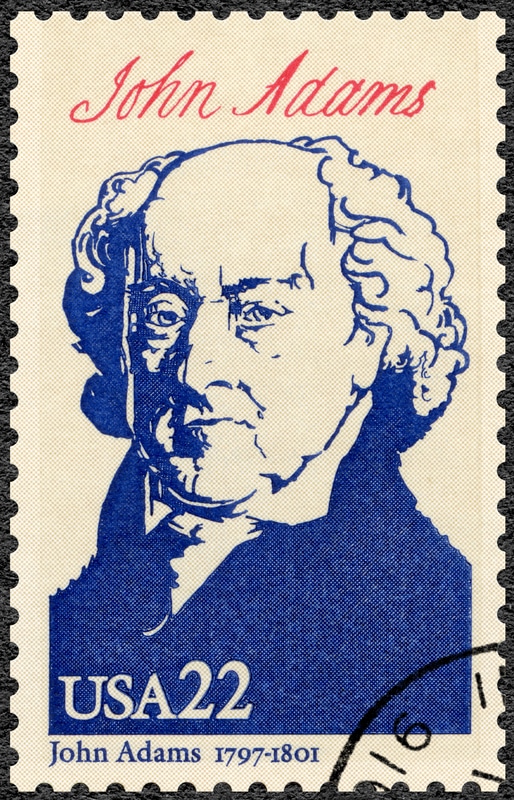Until quite recently, John Adams has been the most underappreciated Founding Father.
Thanks to the extraordinary efforts of historians such as David McCullough, Joseph Ellis, and Richard Brookhiser, not to mention HBO, this sad relegation is slowly vanishing from the nation’s psyche. It has been replaced, instead, by a sturdy and scholarly appreciation for the titanic impact John Adams has had on the course of American history.
American school children, of course, associate Adams with being the first Vice-President and second President. The more studious among them will recall that he was America’s first ambassador to England, the most effusive orator at the Second Continental Congress arguing for independence from England (hence the thunderous nickname, “Atlas of Independence”) and was one side of the most extraordinary correspondence in American history with Thomas Jefferson. Indeed, Adams engaged in a decade-long epistolary exchange of letters with his friend-turned-rival in which he eloquently wrote, “You and I, ought not to die, before We have explained ourselves to each other.”
But beyond the historical feats and minutiae, there is a very human yet extraordinary man who lived an even more extraordinary American life—a life that has profound lessons for young Americans endeavoring to live what the ancients called, “the good life.”
John Adams wasn’t just a political leader and a diplomat, he was a father to a future president, a husband to one of the most extraordinary women in the nation’s history, a friend and foe to historic actors who shared the stage with him, a student, a writer, a dreamer and a realist, a man of stentorian character who sought historic significance over the hollow and transient accolades of an amorphous public. But he was also insecure at times, opinionated at all times, thin-skinned about his achievements, and brusque to the point of alienating everyone from his friends to the entire United States Senate.
With this in mind, Americans of all backgrounds can learn the following lessons by studying the life and convictions of John Adams.
Don’t Hesitate To Be a Supporting Actor—They Can Steal the Show
For over two centuries John Adams languished as a second-tier Founding Father. And for perfectly understandable reasons. He doesn’t have the lyrical idealism of Jefferson, the reputation or battlefield bona fides of Washington, the charming, All-American biography of Hamilton, or the constitutional influence of Madison or Marshall.
And yet, without Adams, none of these men would be on Mount Rushmore or the subject of a hit Broadway musical. As David McCullough has observed, “as a casting director alone he was brilliant.” It was Adams who nominated Washington to be the commander of the Continental Army, Adams who handed drafting duties to Jefferson to compose the initial draft of the Declaration of Independence, and Adams who elevated John Marshall from Secretary of State to Chief Justice of the Supreme Court.
As if this were not enough, he is the husband of Abigail Adams—a woman of towering strength who never hesitated to remedy her husband’s deficiencies, verbally engage Benjamin Franklin at Parisian parties, sternly admonish Jefferson for his heresies against her husband, or confront unbridled racism in her own community. Abigail Adams, in many ways, is the historic archetype of the modern axiom that “behind every successful man is an even more successful woman.”
Adams was also the father of John Quincy Adams, the sixth president, the most well-traveled man of his generation, and possibly the most intelligent man to ever occupy the White House. And yet, despite Quincy’s bounty of intelligence, experience, and education, he was a subpar president whose greatest contribution to America came in his later years as a member of the House of Representatives, forever insisting until his death (which took place on the house floor) that this country founded on claims of universal and natural freedom must come to terms with the bondage of millions living within its borders.
John Adams’s proximity to greatness, genius, and progress should forever imbue him with a reputation for being the greatest supporting political actor in American history.
Many of us endeavor to greatness in our own lives and in our own right. There is the awareness—sometimes slight, sometimes pronounced—that time is running out for all of us. We dream broadly in our childhood and stoke worldly ambition in adulthood. And the truth, for most us at least, is that our dreams will always climb higher than our reality—great aspirations are usually more phantasm than fact. But Adams’s contributions are not that of a patriotic demigod, saving the country with a sword, or writing prose forever remembered by posterity’s children. Instead, he empowered those whose talents were appropriate for the circumstance in which they found themselves. He cultivated the love of his wife, amplified her voice like no other, and lovingly raised a son who is doubtlessly one of the great men of the American 19th century.
American students would do well to understand that this is a more accessible form of greatness, a form of greatness that should inspire all of us in our lives to elevate others when they are worthy, encourage others when they fall, find patience when they err, and never doubt that the judgment of history is rarely in sync with the roar or acclaim of the status quo.
History Remembers Principle Over Popularity
Modern politicians talk of “doing the right thing.” We hear leaders prattle on about “a politics of principle.” And yet, almost nobody ever actually does it. In the maelstrom of conflicting priorities—re-election, special interests, party priorities—the interests of the nation itself often become a secondary concern.
But Adams was always a man who did what was right and honorable, or at least what he perceived to be right and honorable, even at a great personal expense. For instance, as historian Richard Brookhiser has observed, on Adams’s first diplomatic trip to Europe three different sailors on his ship were struck by lightning. But this paled in comparison to the misery he endured on his third trip in which the ship sprung a leak and Adams, along with other passengers, had to work the pumps themselves. The ship barely made it to Spain. As if that were not bad enough, he then had to endure a month-long sojourn to the French border to continue his diplomatic duties.
All of this was endured with the certain knowledge that he would spend large swathes of time away from his beloved wife and children.
He successfully, if clumsily, walked a middle ground during the quasi-war with France in which Republicans wanted a sympathetic policy towards France and many in his own party wanted a more bellicose, aggressive response. Adams vehemently argued for a posture of peace through strength, a middling position that was not particularly popular with anyone, and yet performed the noble end of keeping America out of a fruitless war with France. His actions, while vindicated by virtually all historians, probably cost him the Election of 1800. But in typical Adams fashion, he interpreted defeat as the cost of acting in the long-term interests of the country. To a degree, he wore his defeat as a badge of high republican honor—for in Ancient republics great statesmen such as Cato or Cicero often suffered cruel ends for their public virtue.
History remembers principle over popularity, even if it takes centuries to recognize it. Adams could have taken the writing of the Declaration for himself. He did not. He could have gone to war with France. He did not. He could have declined his country’s request for him to go abroad in dangerous times and on perilous seas at a great personal expense. He did not.
[bctt tweet=”History remembers principle over popularity, even if it takes centuries to recognize it. ” username=””]
He could have died bitter, cranky and disillusioned. He did not. For there is serenity in the quiet knowledge that one has lived an honorable life.
True Leaders Do & Say What No One Else Wants to Do & Say
Every leader dreams of being the conquering hero. Every leader dreams of presiding over a policy that is judged to be successful and just. Every leader dreams of mass adulation and popular acclaim, especially in the democratic spirit of our own age.
Some leaders, however, clamor to do the right thing and let history be their judge and jury.
As Gordon Wood has noted, “No one prided himself more on his independence, on being his own man, under obligation to no one. He defied his father in choosing a career as a lawyer rather than as a clergyman . . . In Europe, negotiating the peace in the early 1780’s, he defied everyone: Congress, his colleagues, and the country’s French ally.”
Nothing demonstrates this better than Adams’s spirited defense of the soldiers accused of murder during the “Boston Massacre” in March of 1770. Ultimately, two privates were convicted of manslaughter and everyone else was set free. In an uncanny but consistent theme of his life, Adams seemed to have understood that short-term scorn often won acclaim when the murky dust of the moment gives way to the clearer and livelier view of posterity.
Even his missteps are imbued with a laudatory spirit of trying to say or do what is necessary, even if nobody else wanted to hear it. There is Adams in Paris quarreling with Franklin who almost gets himself recalled by the Congress. There is Adams presiding over the Senate injecting himself into the debates even though he is eventually censured and silenced by the senators, if for no other reason than his loquacious manner annoyed them to no end. There is Adams the realist about human nature, dangerously musing about the stability of hereditary monarchy or “of the awful distance which should be maintained between some and others.”
And yet, how many of us today, in an era of augmented group-think where we conduct political discourse in echo chambers while holding ourselves into tribes where no one can ever disagree or challenge us, would have the courage to stand up to our own tribe, much less those who are in positions of authority, imminence, or grandiose power? The impulse to be admired, to regale others with sophisticated explanations of why the herd is always correct, is one that is rarely muted in our age of hashtags, viral tropes, or snide memes.
As Adams wrote to his granddaughter, “The longer I live, the more I read, the more patiently I think, and the more anxiety I inquire, the less I seem to know . . .Do justly. Love mercy. Walk humbly. This is enough . . .”
Wise words. Words to live by. Words forever grounded in the fertile soil of this human journey we all take together. Let us be thankful that John Adams can be one of our guides.






